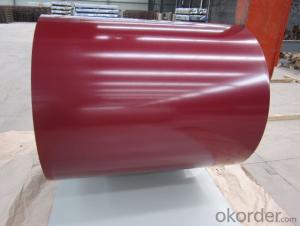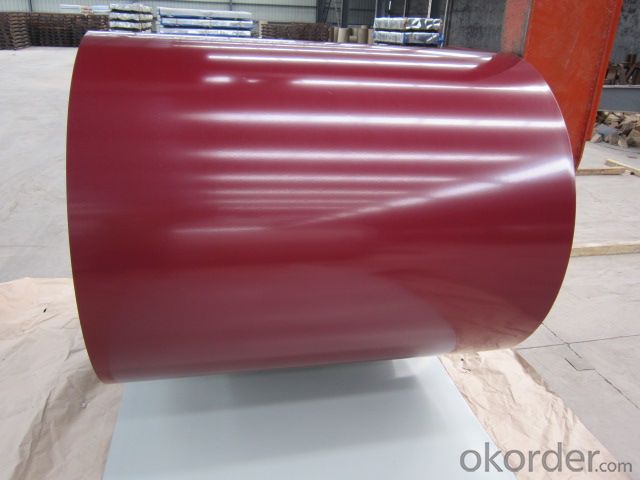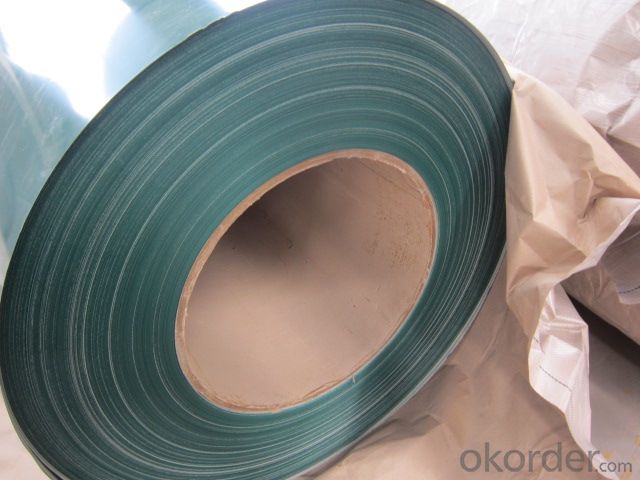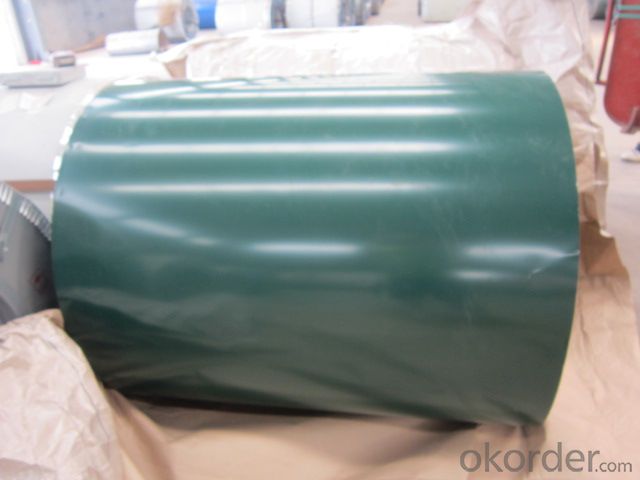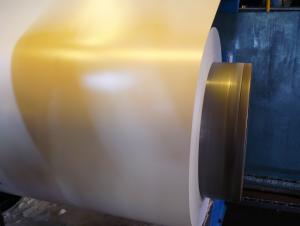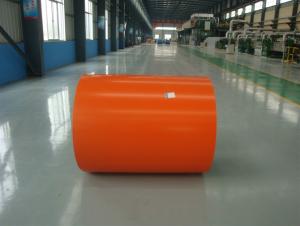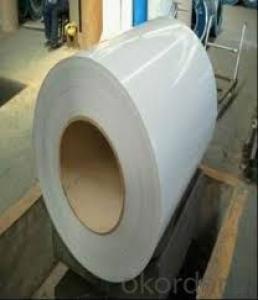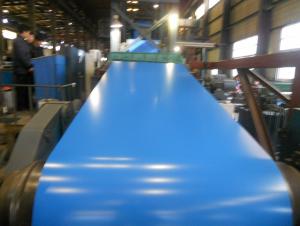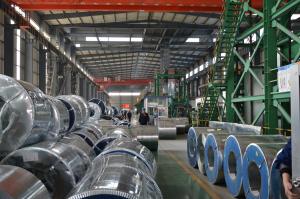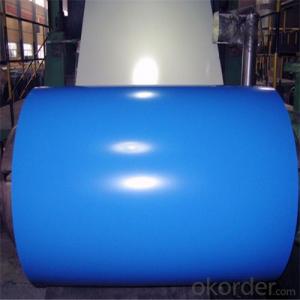PRE-PAINTED STEEL COILS
- Loading Port:
- China Main Port
- Payment Terms:
- TT OR LC
- Min Order Qty:
- -
- Supply Capability:
- -
OKorder Service Pledge
OKorder Financial Service
You Might Also Like
PRE-PAINTED STEEL COILS
As per JIS G3322 CGLCC, ASTM A755,GB/T 12754, EN 10169 DX51D+AZ,
commercial quality or Lock forming quality (LFQ), AZ coating:50 g/m2 to 180 g/m2,
Top surface : 15 - 20 micron polyester + 5 micron primer ,
Back surface: 5 - 7 micron, or 7-8 micron polyester + 5 micron primer. Color: According to RAL Card or Clients' requests. Coil Weight max. 12 MT, Coil ID:508mm/610mm.
With or without protective film on the top side.
Categories of paint: polyester/silicon modified polyester (SMP)/PVDF
Thickness: 0.18-1.20mm
Width: 700-1250mm
Minimum order: 50MT per size
Product Feature
:highly tensile, strong color fastness, good rainproof performance, continuous rolling, good corrosion resistance, easy installment and construction, easily removable, low cost
- Q: How are steel coils used in the manufacturing of engine mounts?
- Steel coils are used in the manufacturing of engine mounts to provide structural support and absorb vibrations generated by the engine. The coils are designed to provide tension and flexibility, allowing the engine to be securely mounted while minimizing the transmission of vibrations to the rest of the vehicle.
- Q: What is the thickness of a steel coil?
- The thickness of a steel coil can vary depending on the specific requirements and application. Typically, the thickness of a steel coil can range from a few millimeters to several centimeters.
- Q: I heard about a new bike the specialized allez steel. Has anyone heard anything about it. it will have all brand new components like shimano 2300 parts and everything. it looks nice.
- Steel? I doubt it's made out of steel, more labor and a heavier frame. Most likely aluminum. Shimano 2300 you say? The Shimano 2300 is the lowest of the low of Shimano road components. Most likely not too reliable and heavy. www.cyclestore .uk/productDetai... I think this is what you might be looking for.
- Q: How are steel coils used in the manufacturing of cables?
- Steel coils are commonly used in the manufacturing of cables to provide strength and support. The steel coils are typically wrapped around the cable core to enhance its structural integrity, increase tensile strength, and protect against external forces. This reinforcement allows the cables to withstand tension and bending, ensuring their durability and reliability in various applications such as power transmission, telecommunications, and construction.
- Q: How are steel coils used in the manufacturing of braking systems?
- Steel coils are used in the manufacturing of braking systems as they are shaped and formed into various components such as brake discs, brake pads, and brake calipers. These coils are made of high-quality steel that provides strength and durability, ensuring efficient and reliable braking performance for vehicles.
- Q: I plan to buy a bushcraft knife ..The blade made up by damascus steel.My question is ,is damascus steel is very strong ?
- Pattern welded /damascus is too expensive to use as an everyday knife, as it can cost more than silver. It's best kept as a collection piece. You'd be stupid to keep it in your pocket or use it everyday. that would be a waste of money. Knives you use everyday might be lost or stolen, or they may get rusted, worn, or dirty..... ruining their value. From that point of view the strength or edge-holding ability means very little. Specifically, the bushcraft knife is pattern welded steel. True damascus or Wootz steel is something you'll only find in museums and private collections. they stopped making it several hundred years ago. Despite what many people have claimed, Wootz damascus was inferior to modern tool steels in every respect. It was a brittle, dirty material. It's legendary status has more to do with myth and storytelling. The reason they stopped making was undoubtaby because more modern methods came along that produced a more consistent product, more quickly and easily. Old technologies tend to be abandoned for good reasons. With pattern welded steel, about a dozen strips of two different grades of steel have been stacked, welded together, the twisted and forged to create interesting patterns. This more of an artistic process and doesn't improve the properties of modern steels. Pattern welded steel is for the most part, inferior to a homogenous blade made of a single grade of steel. First of all, PW is a handmade product which means there will be faults and oxide inclusions incorporated into the steel. The welding process is not perfect. Secondly, in the hardening and tempering process you end up with a compromise between the properties of the two different grades of steel. You end up with a product that is not quite as good as either steel would have been individually. The blade may either be too brittle or too soft.
- Q: What kind of insulation should be used in a steel building?
- Fiberglass batts or spray on foam both work well
- Q: What is the process of uncoiling a steel coil?
- The process of uncoiling a steel coil involves using specialized equipment, such as a decoiler or uncoiler machine, that is designed to carefully unwind the tightly wound coil. The coil is typically mounted onto the machine's mandrel, which holds it securely in place. As the machine rotates, the coil starts to unwind, with the outer layers gradually releasing and straightening out. This process continues until the entire coil is uncoiled, resulting in a flat and straight steel sheet or strip ready for further processing or use in various applications.
- Q: I just bought a dpms ar15 and it says if I shoot steel cases (laquer coated) or foreign ammo it voids the warranty. But before I knew this I bought 200 rounds of Russian steel cased anmo. Think I should just shoot there two hundred and not buy anymore? Some people say all they shoot is steel cased ammo and have no problemAny advice is appreciated
- Steel Case Ammo
- Q: How are steel coils weighed?
- Steel coils are usually weighed using industrial scales or weighing machines. These scales are specifically designed to handle the heavy weight of steel coils and provide accurate measurements. The coils are placed on the scale, and the weight is determined based on the pressure exerted on the scale's sensors.
Send your message to us
PRE-PAINTED STEEL COILS
- Loading Port:
- China Main Port
- Payment Terms:
- TT OR LC
- Min Order Qty:
- -
- Supply Capability:
- -
OKorder Service Pledge
OKorder Financial Service
Similar products
Hot products
Hot Searches
Related keywords
